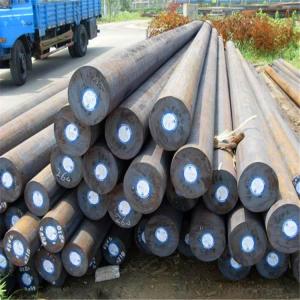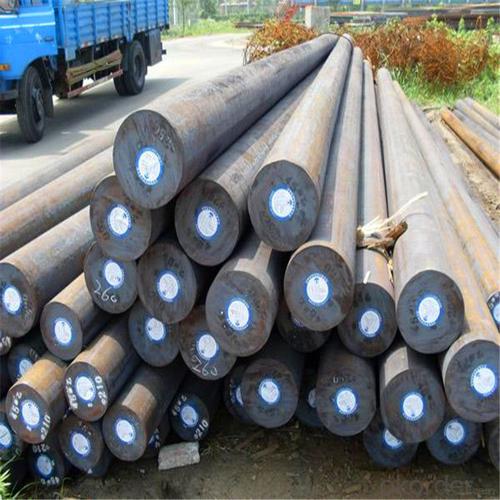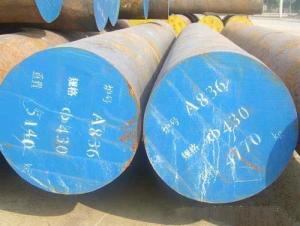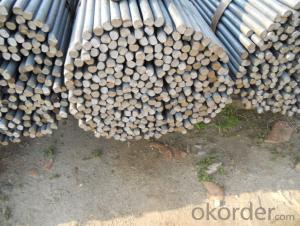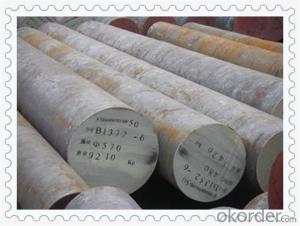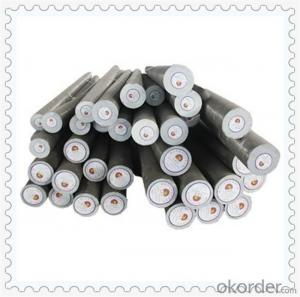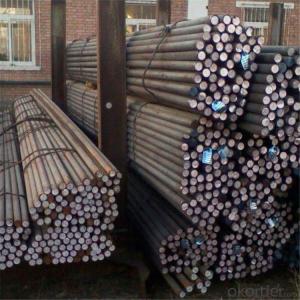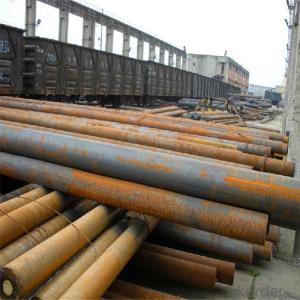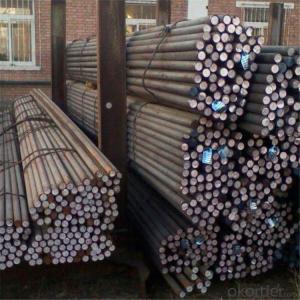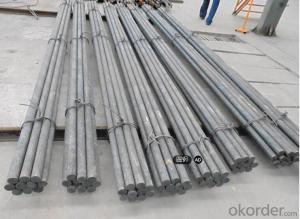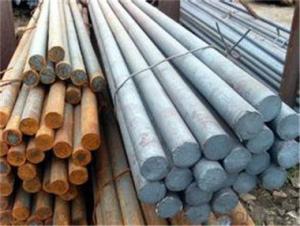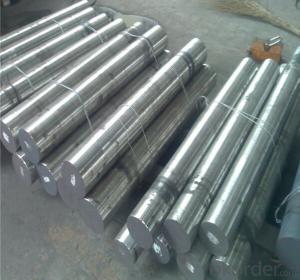CK45 Black Bright Steel Round Bar from Liaocheng,Shandong
- Loading Port:
- Tianjin
- Payment Terms:
- TT OR LC
- Min Order Qty:
- 100 m.t.
- Supply Capability:
- 500000 m.t./month
OKorder Service Pledge
OKorder Financial Service
You Might Also Like
Specification
CK45 Black Bright Steel Round Bar from Liaocheng,Shandong
Product Description of CK45 Black Bright Steel Round Bar from Liaocheng,Shandong
1. Steel grade: SAE1045, 45#, C45, S45C
2. Length: 6M-12M
3. Diameter: 16mm-300mm
4. Product range: round bar, flat bar, square bar
5. Technique: Hot rolled, forged, cold drawn
Specification of CK45 Black Bright Steel Round Bar from Liaocheng,Shandong
Material | CK45 | 16-300mm | ||
Process | EAF + LF + VD + Forged + Heat Treatment (optional) | Length (mm) | Max 12m | |
Heat treatment | Normalized / Annealed / Quenched / tempered | Flat bar | Thickness(mm) | 8-500mm |
Delivery condition | Hot forged +Rough machined (black surface after Q/T)+ Turned (optional) | Width(mm) | 70-200mm | |
Test | Ultrasonic test according to SEP 1921-84 D/d | Length (mm) | Max 12m |
Chemical Composition of CK45 Black Bright Steel Round Bar from Liaocheng,Shandong
C | Si | Mn | Cr | Ni | Cu |
0.40~0.49 | 0.17~0.37 | 0.35~0.65 | ≤0.25 | ≤0.30 | ≤0.25 |
Photo Show of CK45 Black Bright Steel Round Bar from Liaocheng,Shandong
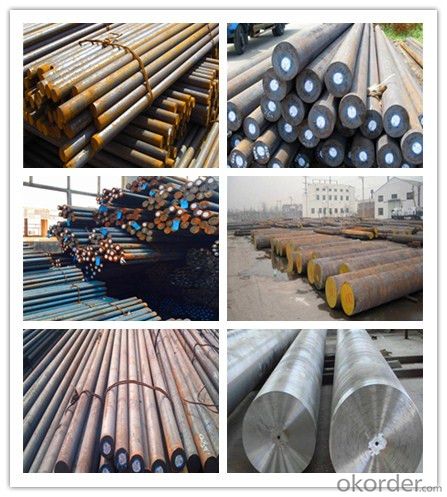
Packing and Delivery:
Packing in bundle package, or as customer's requirements.
Delivery Detail: 45 days after receiving the deposit.
Usage and Applications of CK45 Black Bright Steel Round Bar from Liaocheng,Shandong
1. Steel round bar is used in a large number of architectural and engineering structures. Or it can be used in construction of plants for the production of steel house frames, high-voltage transmission towers, bridges, vehicles, boilers, containers, ships, etc.
2. And we can use this kind of product on the performance of the mechanical parts if the demand is not very high.
3. Some special material steel round bar can be used for main shaft of steamer, hummer shank, with big section and supper force.
Company Information
CNBM International Corporation is the most important trading platform of CNBM group.
Whith its advantages, CNBM International are mainly concentrate on Cement, Glass, Iron and Steel, Ceramics industries and devotes herself for supplying high qulity series of refractories as well as technical consultancies and logistics solutions.


F A Q
1, Your advantages?
professional products inquiry, products knowledge train (for agents), smooth goods delivery, excellent customer solution proposale
2, Test & Certificate?
SGS test is available, customer inspection before shipping is welcome, third party inspection is no problem
3, Factory or Trading Company?
CNBM is a trading company but we have so many protocol factories and CNBM works as a trading department of these factories. Also CNBM is the holding company of many factories.
4, Payment Terms?
30% TT as deposit and 70% before delivery.
Irrevocable L/C at sight.
5, Trading Terms?
EXW, FOB, CIF, FFR, CNF
6, After-sale Service?
CNBM provides the services and support you need for every step of our cooperation. We're the business partner you can trust.
For any problem, please kindly contact us at any your convenient time.
We'll reply you in our first priority within 24 hours.
- Q: How do steel round bars perform under cyclic loading?
- Steel round bars generally perform well under cyclic loading due to their high strength and ductility. The ability of steel to withstand repeated loading and unloading without significant deformation or failure makes it suitable for applications where cyclic loading is present, such as in structural engineering, automotive components, and machinery. However, the performance of steel round bars under cyclic loading also depends on factors like the quality of the steel, design considerations, and the magnitude and frequency of the cyclic loading.
- Q: What are the advantages of using phosphorus-alloy steel round bars?
- Phosphorus-alloy steel round bars possess several advantages: 1. Greater strength: These bars exhibit higher tensile strength in comparison to standard steel bars. This increased strength makes them ideal for applications necessitating a greater load-bearing capacity, such as the construction and automotive industries. 2. Heightened corrosion resistance: Phosphorus-alloy steel demonstrates superior resistance to corrosion when compared to regular steel. Consequently, it boasts improved durability and longevity, particularly in environments with high moisture content or exposure to chemicals. 3. Enhanced machinability: Phosphorus-alloy steel showcases excellent machinability, enabling it to be easily shaped, cut, and formed into various designs or structures. This characteristic makes it the favored choice for industries requiring precision shaping, such as manufacturing and engineering. 4. Diminished brittleness: Phosphorus-alloy steel manifests a lower degree of brittleness in contrast to other steel types. Therefore, it is less prone to breaking or fracturing under sudden impacts or stress, rendering it a safer option for applications where structural integrity is paramount. 5. Cost-effectiveness: Despite its enhanced properties, phosphorus-alloy steel round bars remain cost-effective when compared to other specialty alloys. This affordability renders them a more economical choice for industries seeking high-performance materials without exceeding their budget. 6. Improved weldability: Phosphorus-alloy steel round bars exhibit exceptional weldability, facilitating easy and secure welding connections. This attribute makes them suitable for applications necessitating strong and reliable welded joints, such as construction or fabrication projects. In conclusion, phosphorus-alloy steel round bars offer increased strength, heightened corrosion resistance, enhanced machinability, diminished brittleness, cost-effectiveness, and improved weldability. These advantages establish them as the favored choice for various industries that require high-performance materials.
- Q: What are the options for joining steel round bars?
- There are several options for joining steel round bars, depending on the specific requirements and applications. Some common methods include welding, bolting, and adhesives. 1. Welding: Welding is a widely used method for joining steel round bars. It involves melting the ends of the bars and fusing them together using a welding process such as arc welding, MIG welding, or TIG welding. Welding provides a strong and durable joint that can withstand high loads and stresses. 2. Bolting: Bolting involves using bolts, nuts, and washers to join steel round bars. Holes are drilled through the bars, and bolts are inserted through these holes. The nuts are then tightened to secure the bars together. Bolting is a relatively simple and quick method, and it allows for disassembly and reassembly if required. 3. Adhesives: Adhesives can also be used to join steel round bars. High-strength industrial adhesives are applied to the mating surfaces of the bars, which are then pressed together and left to cure. Adhesive bonding can provide a strong and durable joint, particularly in applications where welding or bolting may not be feasible or desired. 4. Mechanical couplings: Mechanical couplings are specifically designed for joining steel round bars. These couplings typically consist of two separate components that are fitted over the ends of the bars and tightened together using screws, clamps, or other mechanical means. Mechanical couplings provide a reliable and secure joint without the need for welding or drilling. 5. Cold forming: In some cases, steel round bars can be joined through cold forming techniques such as swaging or crimping. These methods involve mechanically deforming the ends of the bars to create a tight and secure joint. Cold forming is often used in applications where welding or other traditional methods are not suitable. It is important to consider the specific requirements, load-bearing capacities, and environmental conditions when selecting the appropriate method for joining steel round bars. Consulting with a professional engineer or welder can help determine the best option based on the specific application and desired outcome.
- Q: Are steel round bars suitable for agricultural applications?
- Steel round bars are indeed appropriate for agricultural applications. Due to its robustness and endurance, steel proves to be a resilient material capable of enduring the challenging conditions frequently encountered in agricultural settings. The utilization of steel round bars in agriculture encompasses a multitude of purposes, including the construction of fences, gates, and animal enclosures. Moreover, they are frequently employed in the creation of structures like barns and storage sheds. Furthermore, steel round bars can serve as dependable support beams or posts for agricultural machinery and equipment. The reliability and adaptability of steel render it an excellent choice for agricultural applications.
- Q: What are the different types of steel round bar alloys used in the construction industry?
- There are several types of steel round bar alloys commonly used in the construction industry. Some of the most popular ones include carbon steel, stainless steel, and alloy steel. Carbon steel is a widely used option due to its high strength and affordability. Stainless steel is preferred for its corrosion resistance properties, making it suitable for environments with high moisture or chemical exposure. Alloy steel, on the other hand, is known for its enhanced mechanical properties and durability, making it ideal for heavy-duty applications in construction.
- Q: What is the difference between a cold finished and a turned steel round bar?
- A cold finished steel round bar is processed through cold drawing or cold rolling processes, resulting in a smoother and more precise surface finish. On the other hand, a turned steel round bar is machined on a lathe, which removes material to achieve the desired dimensions and surface finish. Overall, the difference lies in the manufacturing process and the resulting surface finish of the two types of steel round bars.
- Q: How do steel round bars perform under bending or flexing forces?
- Steel round bars exhibit excellent performance when subjected to bending or flexing forces due to their exceptional tensile strength and ductility. Their ability to resist deformation and retain their shape makes them highly suitable for various applications in construction, manufacturing, and engineering. Moreover, the combination of high strength and ductility enables these bars to evenly distribute and absorb applied loads, thereby minimizing the risk of failure or breakage. To further enhance the behavior of steel round bars under bending or flexing forces, several factors come into play, including alloy composition, heat treatment, and manufacturing processes. Different grades of steel offer varying levels of strength, toughness, and bending resistance. Additionally, heat treatment techniques such as quenching and tempering can significantly enhance the bars' mechanical properties, rendering them more resistant to bending and flexing. Nevertheless, it is crucial to acknowledge that excessive bending or flexing can result in permanent deformation or failure of steel round bars. Overloading or repeatedly subjecting the material to bending beyond its limits can lead to stress concentrations, microcracks, or even fractures. Consequently, it is of utmost importance to establish appropriate bending limits and ensure proper design and installation to uphold the structural integrity and safety of steel round bars when exposed to bending or flexing forces.
- Q: Can steel round bars be used in the manufacturing of shafts?
- Shafts can indeed be manufactured using steel round bars. The utilization of steel round bars for shaft production is common owing to their remarkable mechanical properties, durability, and high strength. The bar's circular form facilitates the machining and forming procedures, rendering it appropriate for producing shafts of diverse lengths and sizes. Moreover, heat treatment can be applied to steel round bars to augment their hardness, strength, and resistance to wear, thus enhancing their suitability for shaft applications.
- Q: Can steel round bars be used in the manufacturing of hydraulic components?
- Yes, steel round bars can be used in the manufacturing of hydraulic components. Steel is a commonly used material in the manufacturing industry due to its durability, strength, and resistance to corrosion. Steel round bars can be machined, shaped, and forged to create various hydraulic components such as pistons, cylinders, and valves.
- Q: Are steel round bars suitable for bicycle frame applications?
- Yes, steel round bars are suitable for bicycle frame applications. Steel is a popular material choice for bicycle frames due to its strength, durability, and versatility. Steel round bars provide excellent structural integrity, making them ideal for supporting the weight and stress placed on a bicycle frame during use. Additionally, steel is known for its high fatigue resistance, which means it can withstand repeated loading and unloading without losing its strength. Steel round bars also offer good weldability, allowing for easy construction and repair of bicycle frames. Overall, steel round bars are a reliable and practical choice for bicycle frame applications.
Send your message to us
CK45 Black Bright Steel Round Bar from Liaocheng,Shandong
- Loading Port:
- Tianjin
- Payment Terms:
- TT OR LC
- Min Order Qty:
- 100 m.t.
- Supply Capability:
- 500000 m.t./month
OKorder Service Pledge
OKorder Financial Service
Similar products
Hot products
Hot Searches
Related keywords
